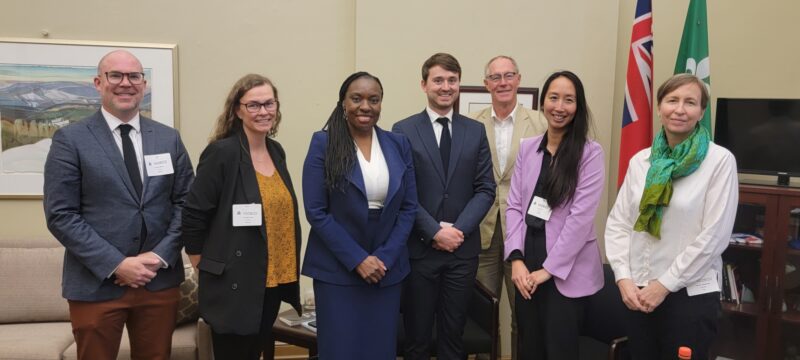
From Left to Right
Chris Caners (SolarShare), Jennifer Ross (Interim Executive Director, Ontario Co-operative Association), MPP Mitzie Hunter (Scarborough—Guildwood), Michael Norris (Senior Director – Impact Pole, Conseil de la coopération de l’Ontario), Dick Bakker (Director, Ottawa Renewable Energy Co-operative), Tam Tran (Director, Strategic Partnerships, Conseil de la coopération de l’Ontario, Marion Siekierski (General Manager, Ottawa Renewable Energy Co-operative) |
|
|
SolarShare General Manager Chris Caners went to Queen’s Park in Toronto on October 26, 2022 for Co-operative and Credit Union Reception & Lobby Day. The event was organized by the Ontario Co-operative Association to facilitate bringing forward issues that are important to co-operatives and credit unions to MPPs, Ministers and their staff.
What did SolarShare speak about?
Along with several other renewable energy co-ops, we would like the Ontario Government to amend the Net Metering Regulation (O.Reg. 541/5) to allow co-operatives to establish virtual net metering facilities.
What is Net Metering?
A program whereby homes and businesses can generate renewable electricity for their own use and excess power is sent to the power grid for a credit to offset their energy costs.
Virtual Net Metering
This program allows for those who don’t or can’t have a renewable energy system on their property to participate in net-metering by being co-owner of an installation. Community members or co-op members, for example, own a solar installation together, located somewhere in the community, and energy produced is sent to the grid. These owners receive credits on their electricity bill based on how many shares of the system they own.
According to current regulations in Ontario, all buildings participating in the net metering arrangement must be owned by the same entity that owns the renewable energy generation facility. SolarShare leases land and space on buildings to operate its solar installations, and as it stands, we cannot participate in net-metering as we don’t own the properties themselves, only the systems. Virtual net metering would allow our renewable energy projects to be connected to the local distribution grid and the electricity generated by them could be sold to businesses and homes in the local distribution area, administered through the existing local distribution billing system.
Why?
Ontario’s Independent Electricity System Operator has set out to procure significant amounts of electricity generation capacity as the Pickering nuclear facility reaches its end of life, and as demand for electricity is projected to increase by 200% to 300% over the next 15 years as electric vehicles and other electric loads increase. This significant increase in demand requires rapid expansion and updates to our electricity infrastructure; virtual net metering will help to achieve that goal with economic and employment benefits for Ontarians.
Co-operatively owned virtual net metering projects are owned by local residents. They can be strategically located in communities across the province to provide electricity and ancillary services to the electrical grid where those services are needed. These projects contribute to local employment through the construction of them and their long-term operation. Finally, co-operatives like SolarShare have already raised tens of millions of dollars from the communities in which these projects are located. This provides citizens the opportunity to invest in their ‘own backyards’, and retains the economic benefits of investment in our electricity infrastructure within Ontario. |